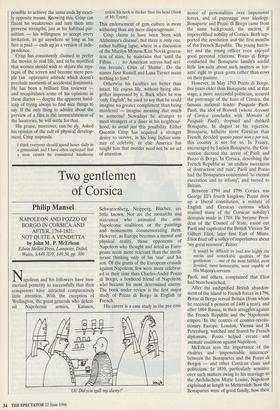Two gentlemen of Corsica
Philip Mansel
NAPOLEON AND POZZO DI BORGO IN CORSICA AND AFTER, 1764-1821: NOT QUITE A VENDETTA by John M . P. McErlean Edwin Mellen Press, Lampeter, Dyfed, Wales, SA48 7DY, f49.50, pp. 306 Napoleon and his followers have mes- merised posterity so successfully that their conquerors have attracted comparatively little attention. With the exception of Wellington, the great generals who defeat- ed Napoleonic armies, Kutusov, Schwarzenberg, Neipperg, Bliicher, are little known. Nor are the monarchs and statesmen who animated the anti- Napoleonic coalitions, or the paintings and monuments commemorating them. However, as Europe becomes a mental and physical reality, those opponents of Napoleon who thought and acted as Euro- peans seem more relevant than the sterile tyrant thinking only of his 'star' and his son. Of the giants of the European crusade against Napoleon, few were more celebrat- ed in their time than Charles-Andre Pozzo di Borgo, a boyhood friend of Napoleon, who became his most determined enemy. The book under review is the first major study of Pozzo di Borgo in English or French.
His career is a case study in the pre-emi- Oil Did you spill my sherry?' nence of personalities over impersonal forces, and of patronage over ideology. Bonaparte and Pozzo di Borgo came from the same background, the ancient, if impoverished nobility of Corsica. Both sup- ported the revolution and the first months of the French Republic. The young barris- ter and the young officer even enjoyed good personal relations. Pozzo di Borgo conducted the Bonaparte family's sordid little law-suits about such matters as ten- ants' right to graze goats rather than cows on their pasture.
However, in May 1793 Pozzo di Borgo, five years older than Bonaparte and, at that stage, a more successful politician, secured the patronage of the hero of Corsica, the famous national leader Pasquale Paoli. Paoli, the idol of Boswell (whose Account of Corsica concludes with Memoirs of Pasquale Paoli), despised and disliked Bonaparte. In disgust at his rejection, Bonaparte, hitherto more Corsican than French, decided: questo paese non e per noi, this country is not for us. In France, encouraged by Lucien Bonaparte, the Con- vention decreed the arrest of Paoli and Pozzo di Borgo. In Corsica, describing the French Republic as 'an endless succession of destruction and ruin', Paoli and Pozzo had the Bonapartes condemned 'to eternal execration and to infamy', and turned to Britain.
Between 1794 and 1796 Corsica was George III's fourth kingdom. Pozzo drew up a liberal constitution, a mixture of English and Corsican customs which realised many of the Corsican nobility's demands made in 1789. He became Presi- dent of the Council of State, eased out Paoli and captivated the British Viceroy Sir Gilbert Eliot, later first Earl of Minto. Eliot fired off a volley of superlatives about `my great resource', Pozzo:
It would be difficult to laud too highly the merits and remarkable qualities of this gentleman . . . one of the most faithful, most devoted, most honourable, most capable of His Majesty's servants.
Paoli, and others, complained that Eliot had been bewitched.
After the undignified British abandon- ment of the island to French forces in 1796, Pozzo di Borgo served Britain (from whom he received a pension of £400 a year), and after 1804 Russia, in their struggles against the French Republic and the Napoleonic empire. In the centres of counter-revolu- tionary Europe, London, Vienna and St Petersburg, watched and feared by French diplomats, Pozzo helped create and animate coalitions against Napoleon.
McErlean sees the importance of the rivalries and 'impenetrable reticences' between the Bonapartes and the Pozzo di Borgos — and other Corsican clans and politicians. In 1810, particularly sensitive over such matters owing to his marriage to the Archduchess Marie Louise, Napoleon explained at length to Metternich 'how the Bonapartes were of good family, how their family counted among the oldest in the island and was certainly the equal of that of the Pozzos.' In 1813, as a Major-General in Russian service, Pozzo di Borgo pushed Bernadotte to attack his former ally Napoleon. At allied headquarters from January to June 1814, as aide de camp of the Tsar, Pozzo urged Alexander I to march on Paris and insisted on Napoleon's abdication. He is said to have exclaimed in joy: 'It is not I who has killed Bonaparte but I have thrown the last spade of earth on his head'. It may have been Pozzo who suggested Elba, an island he knew well, as Napoleon's compensation. After Waterloo, which he witnessed as Russian representa- tive on Wellington's staff, he was the first to inform Louis XVIII that Wellington had won 'perhaps the most glorious and the most important battle in history', and to urge the King's speedy return to Paris.
As Russian ambassador in Paris from 1814 until 1834, Pozzo was so influential that some said that a second Corsican governed France; McErlean calls him 'a force in Europe in his own right'. Indeed Pozzo manipulated events in Europe for longer than Napoleon himself. In 1830, for example, he helped ensure the speedy recognition of Louis-Philippe by other European governments. Surely one of his most satisfying tasks was his role at the congress of Aix in 1818 in ensuring stricter conditions of confinement for the prisoner of Saint Helena. 'He had been, so to speak, the theme of my whole life', he wrote after Napoleon's death in 1821 to the island's Governor, Sir Hudson Lowe, an acquain- tance since they had both served in Corsica in the 1790's. If the contest between Pozzo di Borgo and Napoleon is not a vendetta `in the true sense', as McErlean claims, what is? Indeed the rivalry went so deep, and lasted so long, that a later Pozzo di Borgo bought a section of the Tuileries palace after the fall of Napoleon III and re- erected it on the Pozzo di Borgo mountain above Ajaccio, where it still is.
McErlean has an unrivalled knowledge not only of Pozzo di Borgo's papers and unpublished memoirs, but also of the customs and secrets of Corsica itself, the island at the heart of the story. It is an indication of the need for predictability among readers and publishers of today, that the present work, original, convincing and elegant, if slightly dense, is published by a small press (like Robert Franklin's excellent biography of another anti-Napoleonic diplomat, Lord Stuart de Rothesay, published by Images, Upton- upon-Severn, Worcestershire, 1993). Readers prefer variations on the familiar themes of the Emperor's loves or victories, rather than the challenge of a new person- ality, or a glimpse of the other side of the story. For some readers, however, this account of Pozzo di Borgo's early life will make the wait for the full, fat biogra- phy which McErlean promises seem intolerable.



























































 Previous page
Previous page